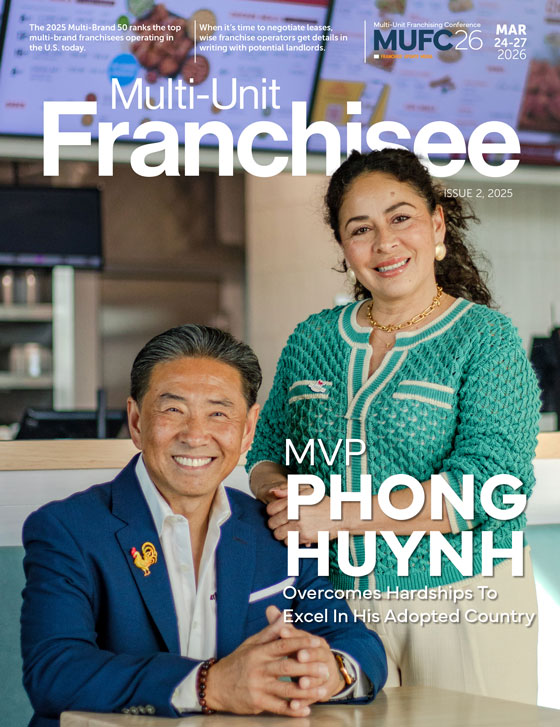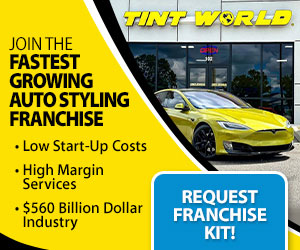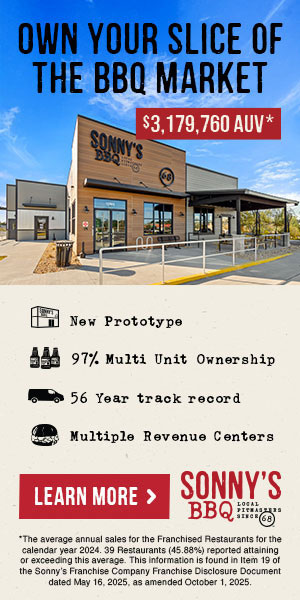The Lease You Can Do: Tips for Navigating Negotiations, Renewals, And Beyond

Mike Philip grew up in northwest Arkansas. He worked in the real estate business there before he opened four Einstein Bros. Bagels and a Slim Chickens restaurant in the region. He’s known some of the area’s commercial property owners for decades.
When he sits down to negotiate a lease for one of his businesses, nothing is understood, nothing can be assumed, and everything in the agreement needs to be spelled out. For franchise operators to draft a lease that works best for them, Philip and other longtime multi-unit franchisees say, they have to get into the weeds with their landlords.
A well-drafted lease should answer the “what ifs” that come with owning a business but not owning the premises. Who’s financially responsible if the restaurant floods because of a preexisting plumbing issue? Who’s responsible for snow removal? What if someone falls in the parking lot? What if a competitor wants to rent space from the landlord in the same shopping center?
“In a business relationship, if I can have it black and white, then there is no gray area,” says Philip, who became Einstein’s first franchisee in 2006. “Gray area is what causes issues. So, by not defining the responsibilities of the franchisee and the landlord, you’re going to doom the relationship. There are no handshake deals in a lease scenario. You’ve got to put it all in writing.”
Sometimes, the fate of a business depends on the details hammered out in the beginning. What constitutes a good lease? What factors are most important? The short answer: It depends.
“At this point in my career, there are things I want in a lease that are important to me that aren’t important to somebody else,” says Jeffrey Klein, a Nevada franchisee who owns 19 locations of Capriotti’s Sandwich Shops, Auntie Anne’s Pretzels, Baskin-Robbins, and The Gents Place. “There are things that people might want in a lease that I don’t care about. It’s really a personal thing.”
There are some key factors franchisees should consider when making lease deals. We called on Philip, Klein, and other multi-unit operators to talk about what they look for in a location, how they approach lease negotiations, and how they manage their relationships with landlords.
Location
Before Philip even signs a franchise agreement, he has at least two locations in mind for the new business. He’s evaluated the locations and talks with the property owners are underway. “Because great locations are so hard to find,” he says. “And that’s not just in my market; that’s everywhere.”
In the past five years, the pace of new construction has slowed because of the pandemic, interest rates, tight credit, and inflation. For Philip, location is the most important factor in the success of his business.
“If someone is describing a site to me and they say, ‘It’s behind this’ or ‘It’s down that street and around the corner from that,’ those are descriptors that let me know I’m not interested. I’m out.”
He pays more for a highly desirable site, but he also makes more money by being there. “I make my location decisions based upon a percentage of what I think the sales are going to be in an A-plus location because that’s when you make your money,” Philip says. “There are so many fixed costs in this business that you really have to do what you have to do to drive that top line.”
It’s a different proposition for Matt Speranza. He and his wife, Dina, are the largest franchisees in The Goddard School network with 14 facilities up and running in Philadelphia, Pittsburgh, and Cleveland and eight in development in Florida. The viability of their schools, which offer private preschool and early childhood education, doesn’t rely on having prime locations that are clearly visible from the road.
“Goddard is a destination point,” Speranza says. “We can maybe take that B-site and not have to put as much money into rent because we don’t need to have that A-site that’s on the main traffic road. Once parents learn that we’re there, our clients, our families, will find us.”
You have to understand what type of business you have, what it needs to be successful, and the market you’re in, Speranza says. The school needs to be in an area where it can thrive.
“For us, we have to have the right amount of children,” he says, “and we have to have the right income level in the area to support The Goddard School.”
Most franchisors have technology that proves useful in finding sites. “AI today is pretty incredible,” Klein says. “You put a bunch of data in, and it spits out a location, and then it’ll give a score. It’ll give a range of what the AI thinks that location will do in sales. But I kind of have an idea of what I think is good and what is bad, and that changes with the business climate.”
Letters of intent
A good lease starts with a letter of intent (LOI), which outlines some terms and conditions that the franchisee and the landlord have preliminarily agreed on, such as rent, deposits, lease duration, permitted uses, and improvements. Franchisors typically have guidelines for what an LOI should look like and what franchise operators should ask landlords for.
“Most franchise brands that I work with have very short LOIs. I like really long LOIs because I want to negotiate some of the things up front, so I don’t waste time or, more importantly, money on an attorney later,” Klein says. “Up front, I get landlords to agree to points that are important to me. Once you negotiate the LOI, the lease is kind of simple because now you’re just putting the language around the LOI.”
The importance of securing expert legal advice to help protect your interests can’t be overstated, Klein says. He tells inexperienced franchisees to “get an attorney who can help you figure out what’s important to you and your family. What risk can you have? Can you afford to sign a personal guarantee?”
More than one commercial property owner has questioned the necessity of some of the details that Klein wants covered in a lease agreement. “When they ask me why, I always use the same answer: ‘It’s for the reason we can’t think of.’ Covid was a reason we couldn’t think of,” he says.
Options
A new build might have walls. It might not. It might have heating and air conditioning. It might not. The cost of finishing a building should be taken into careful consideration. Franchisees can negotiate for rent abatement or a tenant improvement (TI) allowance from the landlord to offset the cost of customizing the space.
“Warm vanilla shells,” which are spaces with HVAC, walls, and a ceiling, can save on upfront costs but likely will come with less of a TI allowance than a “cold dark shell” that has no interior improvements and no HVAC.
“The more you can negotiate on the front end, the less you’re going to spend of your TI allowance on the back end,” Philip says.
For the landlord, offsetting the cost of a build-out often makes sense because the franchisee is “also increasing the value of that property. Even if you don’t stay for the term of your lease, the landlord has a finished space versus an unfinished space,” Philip says. The amount of the TI depends on the market. “Probably the bare minimum now is $25 a square foot to upward of $60 to $90 a square foot,” he says.
Speranza doesn’t take on any of the cost of building out a space. He’s only interested in triple net turnkey leases in which the buildings are constructed for The Goddard School and are ready to move into without major renovations. In turn, he takes on the operating expenses, including property taxes, insurance, and maintenance.
“A lot of developers or landlords want to say, ‘Hey, we’re going to give you X amount toward the build-out of the space,’” Speranza says. “I don’t do it that way because then you have to go out, get a loan, and do everything on your own. I want to use as much of the landlord’s money as possible. Now, that might drive up my per-lease price, but it keeps my cash flow open so that I can go and open more locations. To me, that’s more important.”
For franchisees finishing out spaces, it’s key to negotiate a period that’s rent free.
“If I’m leasing your space and it’s a new construction, it might take me four months to do the improvements,” Philip says. “Obviously, I don’t want to start paying rent until I’ve got something that’s procuring sales.”
Maintenance costs
Ongoing maintenance costs can add up. They should be factored in when negotiating a lease. The agreement should detail which party is supposed to do what. If a landlord provides an HVAC unit, who maintains it? If the exterior glass gets broken by the guy mowing the lawn, who’s responsible?
The common area maintenance (CAM) cost, which is the franchisee’s portion of utilities in common areas, parking lot upkeep, and other shared expenses, can often be a point of contention. At the end of the year, there’s always financial reconciliation due because of the difference between what the landlord estimated those costs would be and what they actually were.
“We’ve learned to anticipate it and to talk to the landlord to make sure we’re mitigating or preparing by adjusting the CAM monthly instead of having a big number at the end of the year,” Philip says.
Even in the triple net agreements preferred by Speranza, where repairs generally fall on the franchisee, there’s plenty to negotiate in a lease when it comes to big expenses, like a roof replacement. After all, the landlord owns the property and retains the value of whatever is put into it.
“Those are all things that I look for when I’m negotiating a lease,” Speranza says. “I try to negotiate one in which we’re at least splitting that cost with the landlord one day. It might not need a new roof for 20 years. But when the whole roof needs to be replaced, then I feel that it should be 50/50.”
Personal guarantees
When it comes to personal guarantees, Klein keeps it simple: He will not sign a lease that demands a personal guarantee from him.
Speranza is willing to give a limited personal guarantee for a set period. A brand new The Goddard School costs between $6 million and $8 million to build, he says. “Instead of personally guaranteeing that whole amount, I would guarantee a portion of that, maybe 20% or 30%. Then, even though we sign long-term, 15-year leases, we try to tear down that guarantee so it goes to zero within 10 years.”
He sees it as only fair. If a franchisee were to go out of business, “the landlord still owns the building,” Speranza says. “They still have value there, and the franchisee doesn’t.”
Lease renewals
In the franchising world, it can be devastating for franchisees to lose their leased space. But that sometimes happens because a franchisee has unwittingly missed a deadline that’s in the lease agreement.
Contracts are different when it comes to how much notice lessees must give to a landlord if they plan to renew their leases. Klein recommends Leasecake, a platform that allows franchisees to keep up with critical dates in the lease. Sometimes, landlords are eager to get new tenants who aren’t locked into a certain rent, he says.
“I’ve gotten spaces because people forgot to let the landlord know they were going to stay,” Klein says. “Then, when they called to renew, they were told, ‘I’m sorry, you’re too late.’ Leasecake gives you warnings.”
During lease negotiations, franchisees should look closely at renewal terms, Philip says.
“How many renewals do you have? And do they match up with the terms of your franchise agreement?” he says. “Typically, a franchise agreement will go 10 years and then usually have another 10-year renewal. Often, your franchisor will want your lease to match up with the terms of at least your initial agreement.”
Speranza negotiates 15-year leases with two five-year options.
“Most of your leases are going to say that the landlord wants to start negotiating the year before. I would say you’ve got to know your lease,” Speranza says. “If you’re thinking about moving, you need to start negotiating your option, if there isn’t one, almost five years in advance. That’s because you may have to go find a new piece of property and build a new building.
“Remember, if you’re waiting until that last year, the landlord has all of the power. If you have your option negotiated ahead of time, he has to honor it. But if you don’t have any options left, then he can jack up the price of your rent, and he’s kind of got you because you need that space.”
Today’s climate
The market is so tight in some regions, and prices of leasing commercial property are at such a premium, that it’s hard to dicker over price.
Emily Harrington, who owned seven Tropical Smoothie Cafe units in the Tampa area, closed her last remaining store in December. Before Tropical Smoothie, a brand that she considers strong, she co-owned 10 Hardee’s locations. She says she’ll probably get back into franchising in the next couple of years, but for now, she plans to sit it out.
The restaurant industry has changed since Covid, she says, with third-party delivery, fewer interactions with customers, and new operational challenges. Leasing commercial space in her market is hard right now.
“It’s very difficult to find space,” she says. “The last store that I closed, I closed because the landlord wanted to renegotiate the whole lease and wanted to raise the rent to a point that just didn’t make economic sense for me.”
Tampa is burgeoning. The real estate market isn’t keeping up, which complicates any negotiations, she says. Tenant improvement dollars are hard to come by.
“The supply isn’t enough to meet the demand. And when that happens, you have a dramatic increase in price,” she says. “Landlords become increasingly difficult to work with because they know if this guy doesn’t want to pay what I want him to, I’ve got five more potential tenants waiting in line that want this space. It’s not just about the dollar amount in the lease. There are all these other components to that lease that you want to think about, and if a landlord has the upper hand, it becomes very difficult to convince him or her that you’re being reasonable. They can go get exactly what they want from somebody else.”
In that type of market, franchisees who can’t afford A-plus locations on Main Street can look for inline space and smaller locations to make the lease more affordable, she says. Her first Tropical Smoothie Cafe was 2,200 square feet. Her last was 1,200 square feet with 10 seats and an outdoor patio, saving her tens of thousands of dollars a year in rent.
The tight market won’t exist forever, she says. Sometimes, patience is required. “Real estate is cyclical,” she says. “So, right now, landlords have the upper hand. They’ve got a lot of cards. But that always comes back around.”
Getting along
Philips thinks most of his landlords would agree that he’s easy to get along with. When commercial property is coming open, the owners often call him first to see if he’s interested. He doesn’t just pay his rent on time. He pays early. As a result, if something is broken, he expects a prompt response and gets it.
“The key to that whole deal is to just have open lines of communication,” he says. “Transparent and honest communication, without emotion, is a waning art.”
The tone of the relationship is often set at the beginning, says Harrington, who bought her first Tropical Smoothie Cafe in 2016. As she negotiated her leases, she always paid attention to whether she had a good rapport with the landlords and consistent communication from them. “If they go two weeks without responding to you, if they’re very slow in getting back to you, that’s a bad sign,” she says. “It means that they’re either not very attentive to their tenants, or they’re perhaps working on something else, and you’re just not a priority.”
Speranza agrees that open communication is key. But he also has this advice: Don’t sweat the small stuff.
“There’s always going to be something, right? Sometimes, you just have to bite the bullet on all the little stuff and fix things,” he says. “I see people in franchising fight with their landlords about every little thing. We just don’t do that. I think of it this way: If it’s your partner or your spouse, there might be lots of things that you might not like about that person, but you work through it. Sometimes, you just have to accept some things.”
When to walk away
The franchisor operators we spoke to say that if the lease doesn’t contain the protections you want, don’t sign it. If it’s more than you can afford, don’t sign it.
“I tell young franchisees that the worst thing you could ever do is sign a bad lease. There’s really nothing worse,” Klein says. “You can have a bad franchise agreement. But if you have a bad lease, you’re dead. Leases are very, very important now. I’ve walked away from a bunch of deals over the last four years. They may have been good locations, but they weren’t good leases.”
To find the right deal, Harrington says, you’ve got to look around—a lot.
“Don’t set your heart on one particular location. If you do that, you overpay. Stay flexible. Find a good broker who can help you source properties. If a landlord knows you’re looking at other properties, they’re more likely to negotiate with you. If they know that you’ve got your heart set on their site, they can charge you whatever they want.”
Share this Feature
Recommended Reading:
| ADVERTISE | SPONSORED CONTENT |
FRANCHISE TOPICS
- Multi-Unit Franchising
- Get Started in Franchising
- Franchise Growth
- Franchise Operations
- Open New Units
- Franchise Leadership
- Franchise Marketing
- Technology
- Franchise Law
- Franchise Awards
- Franchise Rankings
- Franchise Trends
- Franchise Development
- Featured Franchise Stories
FEATURED IN

Multi-Unit Franchisee Magazine: Issue 2, 2025
| ADVERTISE | SPONSORED CONTENT |

$300,000
$250,000





 The multi-unit franchise opportunities listed above are not related to or endorsed by Multi-Unit Franchisee or Franchise Update Media Group. We are not engaged in, supporting, or endorsing any specific franchise, business opportunity, company or individual. No statement in this site is to be construed as a recommendation. We encourage prospective franchise buyers to perform extensive due diligence when considering a franchise opportunity.
The multi-unit franchise opportunities listed above are not related to or endorsed by Multi-Unit Franchisee or Franchise Update Media Group. We are not engaged in, supporting, or endorsing any specific franchise, business opportunity, company or individual. No statement in this site is to be construed as a recommendation. We encourage prospective franchise buyers to perform extensive due diligence when considering a franchise opportunity.